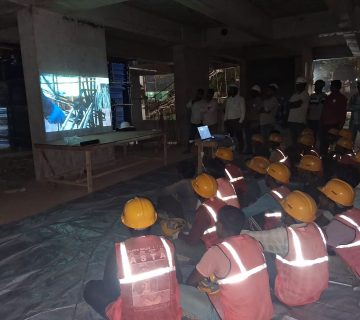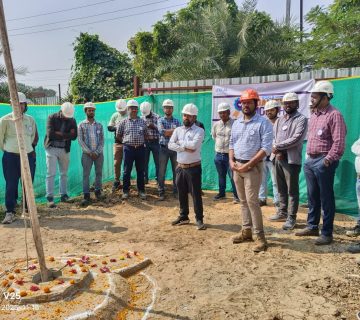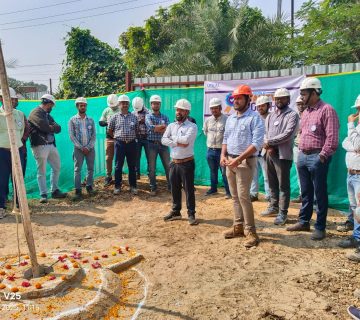

Data Centres: An Emerging Frontier in Indian Real Estate
At the recent CREDAI NATCON held in Singapore, one message echoed strongly among industry leaders and developers alike – Indian real estate must evolve in tandem with the economy it serves. As India’s economic narrative continues to grow more dynamic, so too must its built environment. Over the past few decades, we have seen this evolution unfold in phases. Offices expanded in line with corporate growth, logistics parks and warehouses came up alongside the e-commerce boom, and residential developments adapted to new patterns of urban living. Now, we stand on the threshold of a new and transformative chapter – the rise of data centres as an institutional-grade real estate asset class.
Thank you for reading this post, don't forget to subscribe!The Rise of Data Centres: Fuelled by the Digital Economy
Unlike traditional commercial or retail assets, data centres derive their demand not from physical footfall or population growth, but from the explosive surge in digital activity. Every byte of information – from cloud storage to streaming, fintech transactions to artificial intelligence workloads – needs to live somewhere. And that ‘somewhere’ is a secure, high-performance data centre. India’s digital economy is expanding at an unprecedented pace. With increasing cloud adoption, a booming startup ecosystem, and a growing number of enterprises shifting to AI-driven operations, the need for large-scale, reliable data infrastructure has never been higher. Recent industry projections estimate that India’s total data centre capacity will double from approximately 850 MW in 2023 to nearly 1,700 MW by 2026. This growth trajectory positions India among the fastest-growing data centre markets globally.
Infrastructure-Intensive and Strategic: A Different Kind of Real Estate
Building and operating data centres requires a fundamentally different approach compared to traditional real estate categories. Here, infrastructure is the defining factor. Reliable and uninterrupted power supply, high-speed fiber connectivity, efficient cooling mechanisms, and climate resilience determine a site’s viability. This infrastructure-heavy nature makes the asset class both location-agnostic and deeply strategic. Global tech giants like Amazon, Microsoft, and Google will not necessarily seek prime city-center locations — they will go wherever the fundamentals are strongest. If a location offers stable power, renewable energy options, and seamless connectivity, it becomes a viable hub for large-scale data infrastructure. For real estate developers, this introduces a new paradigm – one that calls for collaboration between real estate, energy, and technology ecosystems.
The Role of Indian States and Policy Support
The next leap in India’s digital infrastructure story will depend heavily on state-level readiness. To attract large-scale data centre investments, states must position themselves as power-surplus, digitally connected, and policy-friendly ecosystems. This involves strengthening grid partnerships, improving renewable energy integration, and ensuring stable regulatory environments. The Government of India has already demonstrated foresight by according ‘Infrastructure Status’ to data centres – a move that unlocks access to long-term financing, accelerates clearances, and improves investor confidence. Several states like Maharashtra, Tamil Nadu, Telangana, and Uttar Pradesh have already rolled out targeted data centre policies, offering incentives such as stamp duty waivers, power subsidies, and single-window approvals. Such proactive governance will be key to making India a preferred global destination for digital infrastructure investments.
An Emerging Asset Class for Institutional Investors
For investors and developers, the implications are clear. Data centres are no longer a niche or experimental segment; they are now institutional-grade, income-generating assets with long-term demand visibility. Their lease structures are typically long-term, with stable cash flows backed by blue-chip tenants. Moreover, their demand is secular – driven by macro trends in digitization, not by cyclical consumption patterns. Just as REITs (Real Estate Investment Trusts) transformed offices and logistics into mainstream investment avenues, we are on the verge of seeing data centres emerge as the next major institutional asset class. For forward-thinking developers and investors, this is not merely a diversification opportunity – it is the foundation for long-term value creation in the digital age.
India’s Digital Future is Being Built Today
As India continues to digitalize every facet of its economy – from governance and finance to healthcare and education – data centres will form the invisible backbone that supports this transformation. They are the silent enablers of the cloud economy, ensuring that every click, transaction, and stream happens seamlessly. For India’s real estate sector, this is more than a business opportunity – it is a strategic responsibility. By investing in the right infrastructure today, developers and policymakers can help position India as a global digital powerhouse tomorrow. The future of real estate is not just about buildings; it is about building the digital foundations of a connected India.






















































































